Film List
Meet women who are factory workers, mothers, telephone operators, and political activists in this range of engaging and inspiring films. From a documentary about Muslim women starting a small business to an Academy Award-nominated production about gender discrimination in the American labor force, the following films will open your eyes to the myriad roles women play in the global economy.
1-800-INDIA: Importing a White Collar Economy

2005. Safina Uberoi. India.
In India, outsourcing has sparked an economic boom, and those working in the industry are making a new life for themselves, balancing traditional Indian family values with Western-style social and economic mores. 1-800-INDIAexamines the effect outsourcing has on Indian family life, on the evolving landscape of urban India, and on the aspirations and daily lives of young Indian citizens, especially women, as they enter the work force.
China Blue
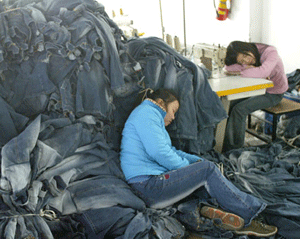
2005. Micha Peled. China.
Made surreptitiously in a blue jeans factory in China, China Blue follows the lives of teenage girls producing jeans that will be sent to the U.S. and other countries to be sold. The girls are paid less than a dollar a day, live in a cement dormitory, and work every day from 8 a.m. to 2 a.m. China Blue explores the effects these alarming living and working conditions may have on China's teenage workers, but also examines the pressure the factory's upper management faces from U.S. companies who demand a low-priced product. China Blue shows the human consequences of a globalized economy.
Europlex
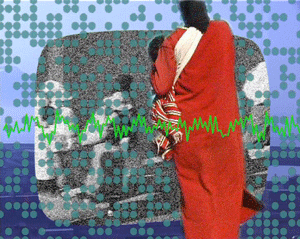
2003. Ursula Biemann and Angela Sanders. Spain/Morocco.
Europlex tracks the daily-sometimes illegal-border crossing activities between Spain and Morocco. The film lays bare the relationship between a First World and Third World country, following domestic workers living in Morocco who cross the border daily to work in Spain and showing how products made cheaply in North Africa are sold in Europe for a high profit in Europe.
La Petite Vendeuse de Soleil
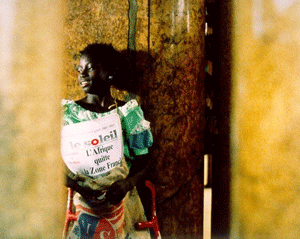
1999. Djibril Diop Mambety. Senegal.
La Petite Vendeuse de Solei is a study of the very unequal means people have to make their way through an increasing global economy. Sili, a 12 year old paraplegic who begs for alms with her blind grandmother in the market, chooses to stop begging and take a job as a newspaper vendor-a job formerly done only by teenage boys. Sili is an immediate success, but must stand up to the bullying boys who feel like she has encroached on their territory.
Laafi Bal
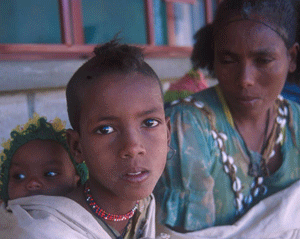
2001. Fanta Regina Narco. Burkina Faso.
Laafi Bal demonstrates the glaring causes of wide-spread unemployment and poverty in Burkina Faso, where few institutional resources and government supports are available, and reveals the debilitating effects this is having on women and youth.
Lakshmi & Me
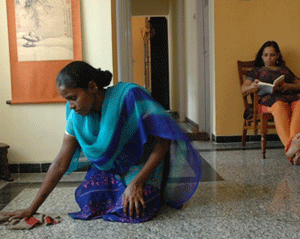
2007. Nishtha Jain. India.
In this documentary, filmmaker Nishtha Jain explores her relationship with Lakshmi, the 21-year-old housemaid who works ten hours a day, seven days a week at Jain's home. As Jain is drawn deeper into Lakshmi's life, she is forced to question many of the things she takes for granted. During a year and a half of dramatic changes, the process of filming has its own impact on unfolding events and on the relationship between the two women.
Life and Debt
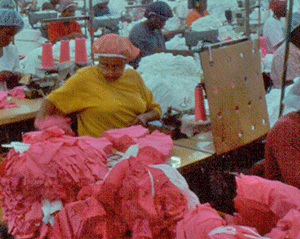
2001. Stephanie Black. Jamaica.
Life and Debt examines the economic and social situation in Jamaica, specifically the impact of the International Monetary Fund, the World Bank, the Inter-American Development Bank and current globalization policies on the country's economy. For example, loans from the World Bank that required economic reforms eventually left the country $4.6 billion in debt. Black explores how unfair voting procedures and restrictive loan policies have hindered the country, and celebrates Jamaica's resilient and dynamic people.
Made in L.A.
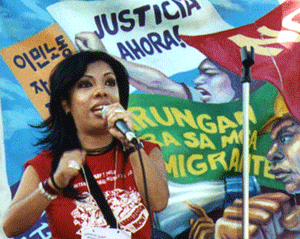
2008. Almudena Carracedo. United States.
Made in L.A. follows the remarkable story of three Latina immigrants working in Los Angeles garment sweatshops as they embark on a three-year odyssey to win basic labor protections from trendy clothing retailer Forever 21. The film reveals the impact of the struggle on each woman's life as they are gradually transformed by the experience. Made in L.A. is a story about immigration, the power of unity, and the courage it takes to find your voice.
Maid in America

Anayansi Prado. 2004. United States.
Maid in America is an intimate, eye-opening look at the lives of las domésticas, as seen through the eyes of Eva, Telma and Judith: three Latina immigrants, each with a very different story, who work as nannies and housekeepers in Los Angeles, California. Through Eva, Telma, and Judith, we see how immigrants are redefining their roles, and how vital domestic workers like them are in many American households. The issue of worker's rights is introduced in the film through Dynamic Workers, a collective of women who have formed their own business to provide job security and benefits, and the Domestic Workers Association, a support organization providing information and advocacy.
Nalini By Day, Nancy by Night
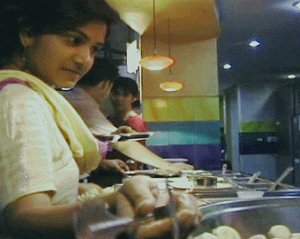
2005. Sonali Gulati. India/United States.
This documentary exploring the outsourcing of American jobs to India, told from the perspective of an Indian living in the U.S., journeys into India's call centers, where telemarketers acquire American names and accents to service the telephone-support industry of the U.S. The film incorporates animation, live action, and archival footage to explore the complexities of globalization, capitalism, and identity.
North Country
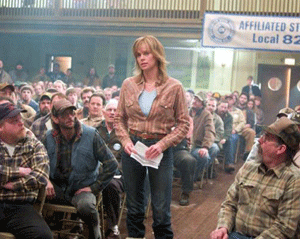
2005. Niki Caro. United States.
Josey Aimes wants a decent job so she can put food on the table and take care of her kids, so she takes a job in the iron mines in her Northern Minnesota community. There, in an industry long dominated by men, she is threatened, insulted, ogled, fondled, belittled, attacked and called filthy names. She fights back, filing the nation's first class-action sexual-harassment lawsuit. The landmark case was won in 1984.
Pickles, Inc.
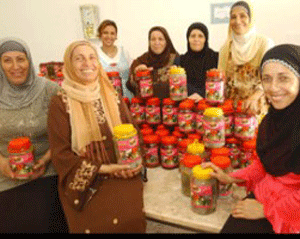
2005. Dalit Kimor. Israel.
In the village of Tamra, in Galilee, eight Arab-Israeli widows challenge social conventions and establish the Azka Pickle Cooperative, seeking financial independence for themselves and their children. With little formal education and no work experience outside of the home, the women face endless hurdles in expanding their business start-up, while their personal lives reflect the joys and sadness of family weddings, bereavement, and loneliness.
Some Real Heat
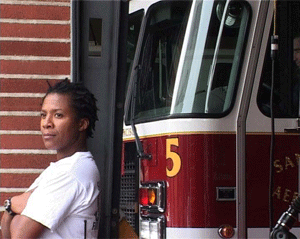
2001. Stefanie Jordan. Germany/United States.
Some Real Heat follows female firefighters in San Francisco on their uphill battle to gain access to the male-dominated field. Jordan focuses on six women who are determined to upset gender roles as they put their lives on the line daily in one of the riskiest jobs around. Some Real Heat also puts these women's stories in a historical perspective, exploring the history of women fire fighters and the gender bias that barred them from officially entering the U.S. Fire Department until 1974. Exploring the myths and realities of this dangerous profession, Some Real Heat delves into the strength and character that distinguishes these women as true modern-day heroes.
Transnational Tradeswomen
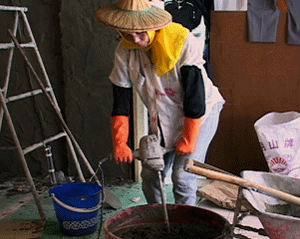
2006. Vivian Price. Pan-Asia.
Filmmaker Vivian Price spent years documenting women working in the construction industry in Asia, and explores how women in many parts of Asia have been doing construction labor for hundreds of years. Transnational Tradeswomenshows that stereotypes of fragile, submissive Asian women are ill-informed, and also reveals that new construction technology is leaving many women without a job, showing that modernization and technology don't always result in economic opportunity or gender equality.


